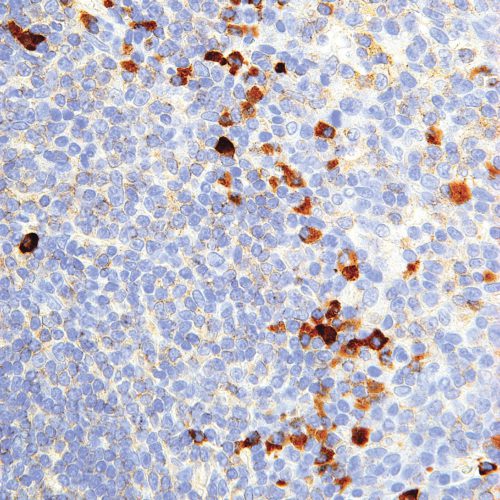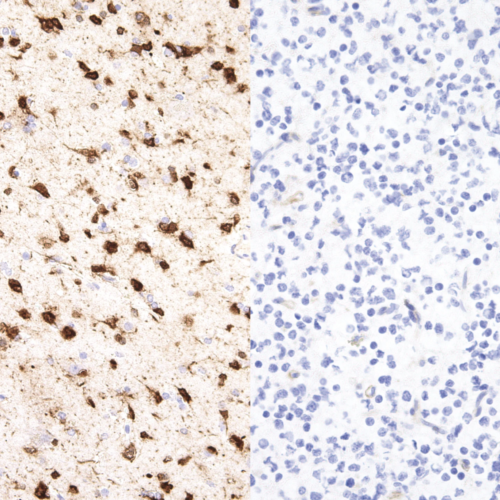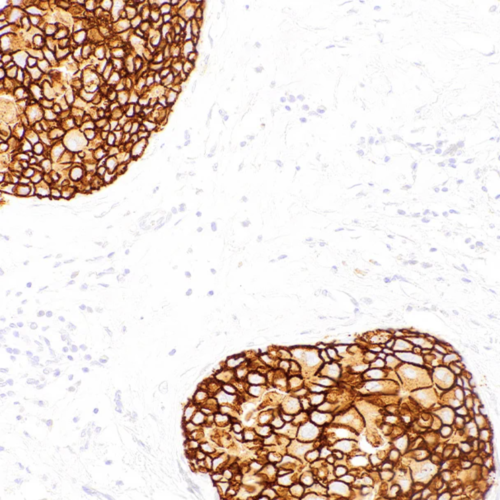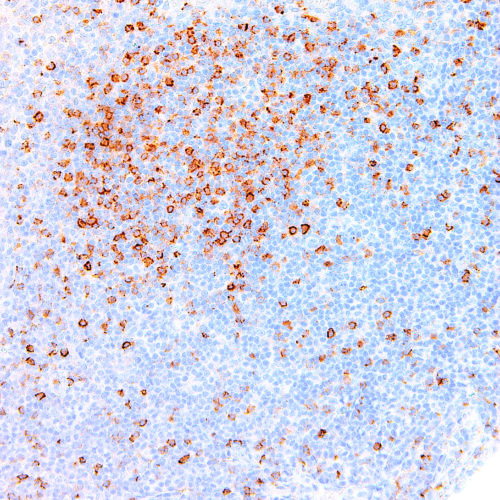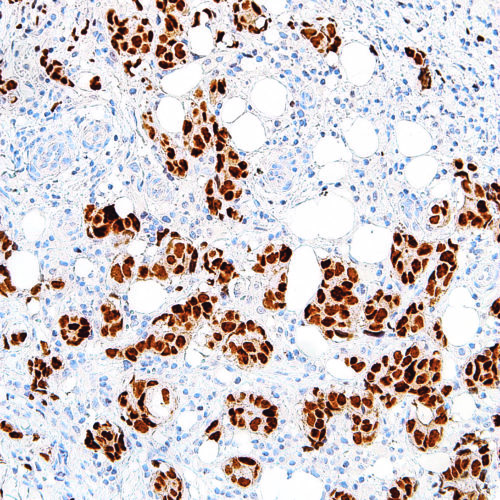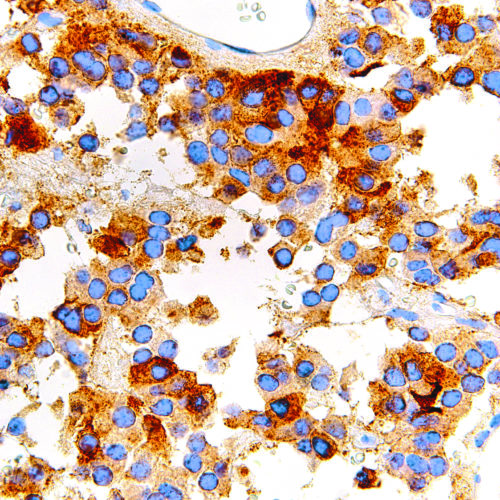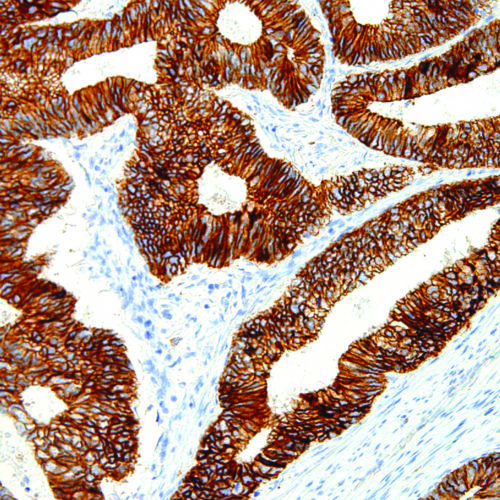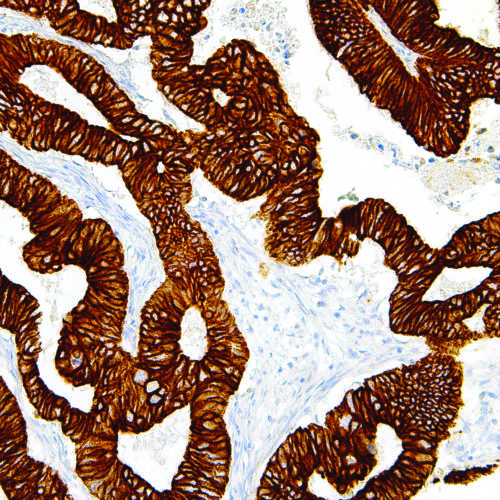High quality products to support Pathologists and Biological and Environmental Scientists
GeneAb™ Kappa
$35.00 – $140.00Anti-Kappa recognizes surface immunoglobulin on normal and neoplastic B-cells, and has been indicated as a potential aid in the identification of leukemias, plasmacytomas, and certain non-Hodgkin’s lymphomas, where the expression of a single light chain class is restricted. The determination of light chain ratio is critical in evaluating B-cell neoplasms, as the majority of B-cell lymphomas express either kappa or lambda light chains, while a mixture of kappa and lambda is characteristic of reactive proliferations. In paraffin-embedded tissue, Anti-Kappa displays strong staining of kappa-positive plasma cells, as well as cells that have absorbed exogenous immunoglobulins.
GeneAb™ IDH1 R132H
$140.00 – $545.00Isocitrate Dehydrogenase 1 (IDH1) is a soluble, cytosolic enzyme involved in the TCA metabolic cycle. The most notable mutation in this enzyme, R132H, is clinically indicated in the majority of astrocytomas and oligodendroglial tumours, with the mutation being associated with more favourable prognosis and increased survival in those patients. IDH1 R132H is also useful in the differential diagnosis between anaplastic glioma and glioblastoma.
GeneAb™ HER2/neu
$90.00 – $450.00The Her2/Neu (c-erbB-2) proto-oncogene is a transmembrane receptor tyrosine kinase that is clinically indicated in a number of carcinomas. Overexpression of the c-erbB-2 protein has been associated with ductal breast cancer, as well as pulmonary and gastric adenocarcinomas. A correlation between Her2 and p53 has also been documented, as overexpression of both proteins has been associated with early invasion and metastasis in bladder cancer.
GeneAb™ Hairy Cell Leukemia
$150.00 – $680.00Anti-Hairy Cell Leukemia stains various B-cells in the follicular mantle zone and virtually all cases of hairy cell leukemia. It also stains some high grade B-cell lymphomas.
GeneAb™ GATA3
$120.00 – $595.00GATA3 is a transcription factor important in cell proliferation, development, and differentiation. GATA3 is mostly observed in breast and urothelial carcinomas, and rarely present in other cancers such as endometrial endometrioid adenocarcinoma. Among the breast carcinomas, GATA3 has a lower expression in luminal B subtype breast carcinoma. Studies have found GATA3 expression to be associated with ER (estrogen receptor), PR (progesterone receptor), and Her2 in breast cancer cases. Urothelial carcinomas stain positively for GATA3 in invasive or high grade tumors, therefore Anti-GATA3 is useful for carcinoma diagnosis when breast and bladder are plausible.
GeneAb™ FSH
$110.00 – $460.00Follicle-Stimulating Hormone (FSH) allows for progression of ovarian folliculogenesis, and enables Sertoli cell proliferation in the testis. Anti-FSH reacts with FSH-producing cells, therefore FSH staining is useful for classifying pituitary cancers and understanding pituitary disease.
GeneAb™ E-cadherin
$95.00 – $390.00E-cadherin is an intercellular adhesion molecule present in epithelial cells. Anti-E-cadherin stains glandular epithelium, as well as lung, gastrointestinal and ovarian adenocarcinomas. A panel of antibodies against E-cadherin and p120 is also used to differentiate ductal (membranous staining) and lobular breast cancer (cytoplasmic staining). Anti-E-cadherin also stains some thyroid cancers.
GeneAb™ Cytokeratin 19
$65.00 – $250.00Cytokeratin 19 (CK19) forms intermediate filaments found in the intracytoplasmic cytoskeleton of epithelial tissue and provides mechanical support. Anti-Cytokeratin 19 stains epithelia and epithelial malignancies such as carcinomas of the colon, stomach, pancreas, biliary tract, liver, and breast. Cytokeratin 19 is a useful marker for distinguishing hepatocellular carcinoma from intrahepatic cholangiocarcinoma. This differentiation is improved when stained in combination with Cytokeratin 7, CAM5.2l, Ber-EP4/MOC31, HepPar1 and TTF1. Cytokeratin 19 staining can also be used to recognize thyroid papillary carcinomas.
